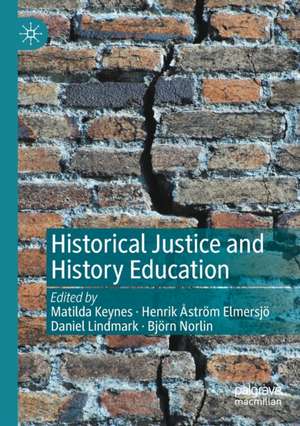Historical Justice and History Education
Editat de Mati Keynes, Henrik Åström Elmersjö, Daniel Lindmark, Björn Norlinen Limba Engleză Paperback – 22 iul 2022
| Toate formatele și edițiile | Preț | Express |
|---|---|---|
| Paperback (1) | 948.92 lei 6-8 săpt. | |
| Springer International Publishing – 22 iul 2022 | 948.92 lei 6-8 săpt. | |
| Hardback (1) | 954.31 lei 6-8 săpt. | |
| Springer International Publishing – 21 iul 2021 | 954.31 lei 6-8 săpt. |
Preț: 948.92 lei
Preț vechi: 1157.22 lei
-18% Nou
Puncte Express: 1423
Preț estimativ în valută:
181.57€ • 189.58$ • 150.28£
181.57€ • 189.58$ • 150.28£
Carte tipărită la comandă
Livrare economică 04-18 aprilie
Preluare comenzi: 021 569.72.76
Specificații
ISBN-13: 9783030704148
ISBN-10: 3030704149
Ilustrații: XXII, 435 p. 9 illus., 5 illus. in color.
Dimensiuni: 148 x 210 mm
Greutate: 0.54 kg
Ediția:1st ed. 2021
Editura: Springer International Publishing
Colecția Palgrave Macmillan
Locul publicării:Cham, Switzerland
ISBN-10: 3030704149
Ilustrații: XXII, 435 p. 9 illus., 5 illus. in color.
Dimensiuni: 148 x 210 mm
Greutate: 0.54 kg
Ediția:1st ed. 2021
Editura: Springer International Publishing
Colecția Palgrave Macmillan
Locul publicării:Cham, Switzerland
Cuprins
Chapter 1. Introduction: Connecting Historical Justice and History Education; Matilda Keynes, Henrik Åström Elmersjö, Daniel Lindmark and Björn Norlin.- Part I: State-Sponsored Processes and Education.- Chapter 2. Recontextualizing historical injustice into education: The relationship between a White Paper and a textbook on the abuse of the Roma in Swedish history; Malin Arvidsson, Henrik Åström Elmersjö.- Chapter 3. Taking responsibility for the past: Theoretical and educational considerations, illustrated by South African experience; Sirkka Ahonen.- Chapter 4. Education and truth commissions: Patterns, possibilities and implications for historical justice; Julia Paulson, Michelle J. Bellino.- Part II: Historical Justice in Public History Spaces.- Chapter 5. The Hanaoka Incident and Practices of Local History and Memory Making in Northern Japan; Erik Ropers.- Chapter 6. Historical narratives and civic subjectification inthe aftermath of conflict; Daniela Romero-Amaya.- Chapter 7. Generating and Popularising Historical Knowledge in a Reconciliation Pro-cess: The Case of the Church of Sweden and the Sami; Björn Norlin, Daniel Lindmark.- Chapter 8. The role of commemoration in history and heritage: the legacy of the World War One Engagement Centres; Nicola Gauld, Ian Grosvenor.- Chapter 9. 9.Challenging ‘comfort women’ discourse: rethinking intersections of historical justice and history education; Anna-Karin Eriksson.- Chapter 10. Ethics and historical justice; Göran Collste.- Part III: Educational Materials: Textbooks, Curricula, Policy.- Chapter 11. Textbook Revisions as Educational Atonement? Possibilities and challenges of history education as a means to historical justice; Eleni Christodoulou.- Chapter 12. Redressing historical wrongs or replicating settler colonialism? Social studies curriculum reform in Canada; James Miles.-Chapter 13. Narrative Justice? Ten tools to deconstruct narratives about violent pasts; Angela Bermudez.- Chapter 14. History education, transitional justice and politics of reconciliation: Multi- and univocality around violent pasts in South African and Rwandan textbooks; Denise Bentrovato.- Part IV: Pedagogy, Teachers, and Students.- Chapter 15. Practicing reconciliation in a Canadian book club; Jonathan Anuik.- Chapter 16. Developing historical consciousness for social cohesion: How South African students learn to construct the relationship between past and present; Natasha Robinson.- Chapter 17. Historical justice and the Holocaust in history education; Andy Pearce, Stuart Foster.- Chapter 18. Do teachers care about historical justice? Teaching about the Holocaust, genocide, and colonialism in England; Heather Mann.- Chapter 19. Political good-will, moral lessons, historical justice? Upper secondary school students onthe motives and effects of historical apologies; Jan Löfström.
Notă biografică
Mati Keynes is a Doctoral Researcher at the Australian Centre for Public History, University of Technology, Sydney, Australia.
Henrik Åström Elmersjö is Associate Professor of History and Education at the Department of Education, Umeå University, Sweden.
Daniel Lindmark is Professor of History and Education at the Department of Historical, Philosophical and Religious Studies, Umeå University, Sweden.
Björn Norlin is Associate Professor of History and Education at the Department of Education, Umeå University, Sweden.
Henrik Åström Elmersjö is Associate Professor of History and Education at the Department of Education, Umeå University, Sweden.
Daniel Lindmark is Professor of History and Education at the Department of Historical, Philosophical and Religious Studies, Umeå University, Sweden.
Björn Norlin is Associate Professor of History and Education at the Department of Education, Umeå University, Sweden.
Caracteristici
Examines how expectations of historical justice movements are understood within educational contexts Draws together research from a multitude of global contexts to analyse the role of history education in processes of historical injustice Explores the many ways in which education is understood as both a site of historical injustice and a mechanism for redress
